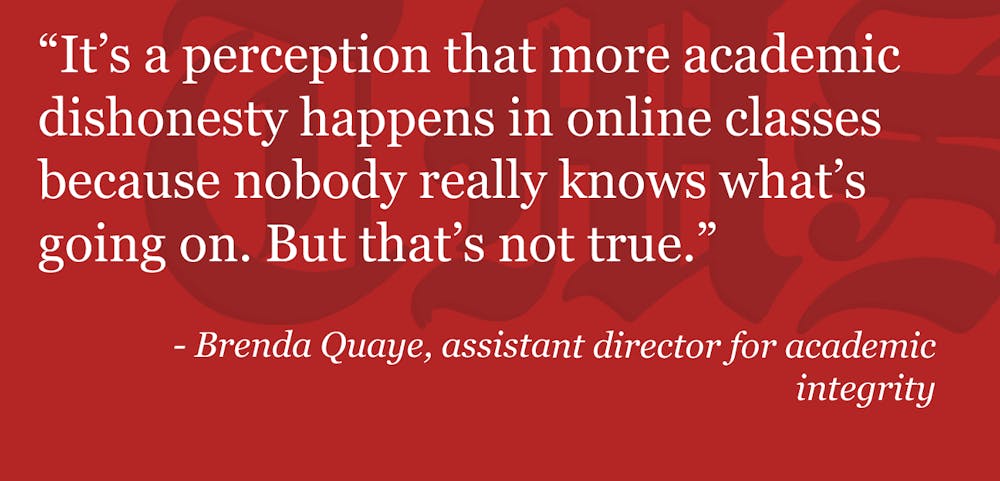Despite classes at Miami University being mostly online for the entire academic school year, Miami’s Office of Academic Integrity has not seen an increase in academic dishonesty cases due to the pandemic.
Brenda Quaye, assistant director for academic integrity, said there was a slight increase in cases when students went remote last spring, but also that cases increased last year overall because of the new reporting process.
“We were already seeing a slight increase in our caseload,” Quaye said, “which I think came from making it easier for faculty members to submit reports, and we did a lot of education for faculty members about how to submit and why to submit.”
Instead of reporting academic dishonesty to department chairs, professors now complete a central reporting form that goes to Quaye’s office.
During the 2017-18 school year, 496 cases of academic dishonesty were reported. During the 2018-19 school year, 480 were reported. This number increased to about 700 in the 2019-20 school year, though not all cases are settled yet.
This academic year has seen about 500 cases of academic dishonesty so far, and Quaye said her office typically gets 100 or more cases in the last few weeks of the semester.
“It’s a perception that more academic dishonesty happens in online classes because nobody really knows what’s going on,” Quaye said, “but that’s not true.”
Nationally, however, many universities have seen increases in academic dishonesty with the advent of online classes.
Although the amount of reported cases hasn’t increased at Miami, the type of cheating reported has changed.
The most common type of cheating in previous years has been unauthorized collaboration — students working together on assignments that are supposed to be done independently. Now, students are more likely to use outside resources, like class notes or the internet, on exams or quizzes.
Quaye said some students have always used outside resources on exams and quizzes, but it’s easier to do so remotely.
“Sitting in a physical classroom taking an exam, it’s harder to pull out a phone or a computer and look stuff up,” Quaye said.
Enjoy what you're reading?
Signup for our newsletter
Reza Akhtar, professor of mathematics, agreed it’s easier for students to cheat online. He said he has personally seen an increase in cheating within the mathematics department, and he helps the department chair with hearing cases because there are so many within his department.
“When it comes to cheating in [person], it’s usually cheat sheets because those are the easiest to sneak in,” Akhtar said. “There’s less of that and more looking up solutions on Chegg.com or the internet. Chegg is kind of the curse of faculty.”
One sophomore, who spoke under the condition of anonymity, said she rarely cheated before being a remote student in the fall semester but frequently double-checked her answers on unproctored exams.
“If I don’t know the answer or I’m not 100% sure I’m right, I’ll just look it up,” she said.
She said cheating, for her, was usually the result of being overworked and having to prioritize certain classes and assignments over others. She most often cheats in classes she sees as having no value to her career path.
“I have a lot of other work, and I focus on the work that I know I have to focus on to get the good grade,” she said. “Whereas if I know I can double check something if I’m not 100% sure … it’s a lot easier to push that stuff off. It’s not much of a priority because it’s not as much of a risk.”
Although Quaye hasn’t seen an increase in cases, she thinks the pandemic has created new stressors that can lead students to cheat.
“We absolutely recognize that the situation is stressful and difficult for everybody and that people are dealing with not being here, being somewhere else, might be technology issues, there might be concerns about health and wellness within families, people have other obligations,” Quaye said. “Some of those things that then put a student in a situation where they think their only option is to cheat.”
Akhtar thinks the online setting offers more outlets to cheat, and because of this, some students may be more likely to cheat.
“There are plenty of opportunities to cheat, and I think for people who don’t have any compunction about it, there’s maybe a greater temptation to yield to the opportunity to cheat,” he said.
For the sophomore, cheating was mainly a result of time management, as well as ease of access. Whatever the reason is for students cheating, she said many of her friends have also been academically dishonest.
“I would say that the majority of people that I know have cheated on at least something,” she said. “Where they’ve double checked something or they’ve looked up something.”




